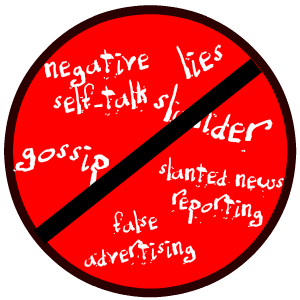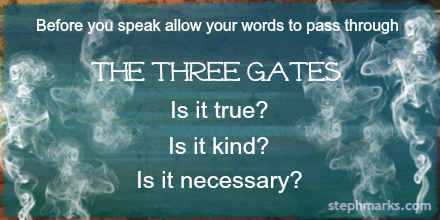
I Wonder: Are You Impeccable with Your Word?
 Sometimes you read a book, and even though you may not apply all that it tells you (cash its checks), it sticks with you over time. The Four Agreements by Don Miguel Ruiz has been such a book for me.
Sometimes you read a book, and even though you may not apply all that it tells you (cash its checks), it sticks with you over time. The Four Agreements by Don Miguel Ruiz has been such a book for me.
The general premise of the book is that by replacing our old agreements, which led us domestication, with new agreements, our lives can be transformed. We have lived our lives being told what to do and expected to agree. In so doing, we have lost sight of who we really are.
Let’s take a look at the first of the four agreements.
1. Be impeccable with your word.
Don Miguel wastes no time in jumping right into the thick of things. In a world filled with hype and tripe, this seems a good, though challenging place to start.
Right off the top of your head, what do you think this statement means?
First, let’s define impeccable. Here is what dictionary.com says:
impeccable
1. faultless; flawless; irreproachable:
“impeccable manners.”
2. not liable to sin; incapable of sin.
Sounds simple enough, doesn’t it? Watch what you say, kiddo!
Basically, I would say that’s correct, but when you look deeper at the power and potential of your words, this becomes a very significant statement. He even goes so far as to quote the Bible:
“In the beginning there was the word, and the word was with God, and the word is God.” John 1:1
Your creative power is manifested through your word. It is no small matter.
So, think about it. How have words been used over the course of history to shape the world? How are words used today? Much good has come from the mindful, intentional use of words. Much harm has come through manipulation of words to achieve a particular result. He uses the example of Hitler convincing a nation of intelligent people “to commit the most atrocious acts of violence.” (p. 27)
Throughout our lives, we have heard thousands, probably in excess of millions of words expressing ideas, beliefs, and opinions. Many have been most persuasive in causing us to form our own ideas, beliefs, and opinions, often in the image of those who went before us.
Were they true? Maybe. Did we stop to question? Perhaps, though, as children, we did not know better. In the not-too-distant past, children were expected to be seen and not heard, so backtalk was swiftly handled by our parents and teachers. Young opinions were quickly laid to rest.
But do we stop and question now, as adults? Or do we allow the voices around us — our family, our friends, our peers, our employers, the news media, advertisements, Facebook — to manipulate us into believing what we may know deep inside to be untrue?
The answers? Sometimes, if we are not paying attention.
Beyond the influence of what we hear in the world around us, how do you communicate with others?
Are you impeccable with your word? Do you always tell the whole truth and nothing but the truth, or do you occasionally embellish or outright lie to get yourself out of a spot?
What do you tell yourself about who you are? Do you speak unkindly to yourself? Do you degrade yourself with unkind words?
Anyway …
Don Miguel introduces the idea of “sin” which is used in our definition above. I have personally battled with the idea of sin, especially in the days when I was a regular in a mainstream church. Sin was something evil and nasty, and you wanted no part of it. There was a vaguely specific list of items which fit into the sin category. They were often adjusted depending on the topic of the day’s sermon.
What I have come to understand is that sin is missing the mark (an archer’s term). You know what to do, but you don’t do it.
Don Miguel states,
“A sin is anything you do that goes against yourself. Everything you feel or believe or say that goes against yourself is a sin. You go against yourself when you judge or blame yourself for anything.” (p.31)
Being impeccable, on the other hand, means that you “take responsibility for your actions, but you do not judge or blame yourself.” He calls self-rejection the greatest sin of all.
Throughout thisdiscussion chapter, Don Miguel speaks of how we are all living in a dream. He alludes to heaven and hell and how our words can move us toward one or the other. Quite frankly, I don’t fully grasp some of what he says, but I certainly get the jist of it.
This much I do know: our very best choice is to stay far away gossip, negative self-talk, slander, false claims, lies, distortions of the truth, unfounded opinions, and the like.
 When speaking, it is in our best interest to tell the truth at all times, to be mindful of what we are saying and aware of the effect it may have on the one to whom we are speaking. I am reminded of the three gates, which, when passed through, provide a sweetness and kindness to our words.
When speaking, it is in our best interest to tell the truth at all times, to be mindful of what we are saying and aware of the effect it may have on the one to whom we are speaking. I am reminded of the three gates, which, when passed through, provide a sweetness and kindness to our words.
I think I can honestly say that we know when we are speaking impeccably.
And we know when we’re not.
Keep it honest. Keep it kind. Keep it real.
Be impeccable with your word.
How are you measuring up to impeccability with your own words?
Speaking mindfully,
Steph Marks
– – – – – – – – – – – – – – –
What are your thoughts on this concept? Feel free to share your thoughts in the comments below.
– – – – – – – – – – – – – – –

